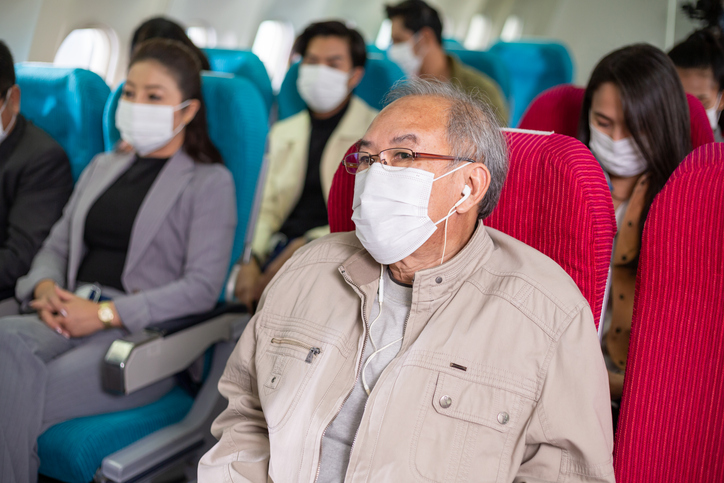An amendment prohibiting the use of federal funds to enforce mask mandates on passenger airlines, commuter rail, rapid transit, buses, or any other form of transportation through the end of fiscal year 2024 passed the U.S. Senate in a 59-to-38 vote on October 25.
Sen. J.D. Vance (R-OH) introduced the amendment to a three-bill Senate “minibus” appropriations legislation. To take effect, similar language would have to be included in either an omnibus appropriations bill, funding for the U.S. Department of Transportation, or a stand-alone measure passed by Congress and signed into law by President Joe Biden. The federal government was working under a temporary spending measure that expires in January and February, as of press time.
Vance gained the bipartisan support of 10 Democrats: Tammy Baldwin (WS), Michael Bennet (CO), Sherrod Brown (OH), Tim Kaine (VA), Marky Kelly (AZ), Amy Klobuchar (MN), Joe Manchin (WV), Jacky Rosen (NV), Jean Shaheen (NH), and Jon Tester (MT).
‘Cycle of Public Health Panic’
Speaking on the Senate floor on October 25, Vance called “the never-ending cycle of public health panic that greets the rise of a respiratory virus, that there is very little we can do to stop or control,” unacceptable.
“We know, of course, that the era of mask mandates caused a lot of problems,” said Vance. “It caused problems for our kids, it caused developmental delays for schoolchildren, it caused a lot of rancor and a lot of division within our common American family. If people want to wear masks, of course, they should be able to. But if people don’t want to wear masks on airplanes, on transit, they should have that option as well, and that’s all that my amendment does.”
Vance said the amendment is “narrowly scoped,” compared to the broader Freedom to Breathe Act the Senator introduced in September. It would permanently ban mask mandates in transportation, federal bureaucracies, and schools.
Commenting on the violence that emerged on airlines over the enforcement of masking, the Air Marshal Association (AMA), whose members were “routinely diverted from their national security mission to monitor and respond to masking related incidents,” stated its support in a September 6 letter Vance received from AMA President John Casaretti.
“We support a permanent ban on masking requirements in public transportation,” Casaretti wrote.
Getting Real on Masks
“The passage of Vance’s amendment is welcome news,” said Gregg Girvan, a resident fellow at the Foundation for Research on Equal Opportunity. “The evidence on the effectiveness of masks is quite thin and often involves retrospective studies rather than randomized trials to minimize bias.”
“The bipartisan support shows that many on both sides of the aisle want to move on from the pandemic,” Girvan said. “But more importantly, it’s an acknowledgment of what many of us have known for a while, that COVID is widespread, and that measures that were ostensibly pushed on the public to protect the vulnerable are not effective. …Data proves conclusively that there is no point in public health interventions like masking. Since January 2023, excess mortality in the United States is nonexistent.”
That was the case despite low levels of mask usage and very low participation in getting COVID boosters, says Girvan.
“These senators have science on their side,” said Marilyn Singleton, M.D., J.D., a senior fellow at Do No Harm.
“Medical freedom for health care professionals and patients is a key component of trust in one’s clinician,” said Singleton. “Freedom and trust breeds adherence to medical treatment and wellness suggestions, keeping our patients healthier. Even the CDC has now admitted that masks alone do not stop the spread of COVID. Masking advice always includes handwashing and respiratory etiquette…and people are always free to wear masks if they so choose.”
Congress Needs a Spine
In terms of political progress, Girvan says Congress is insufficiently assertive, as members repeatedly fail to maintain constitutional authority over federal agencies.
“Sadly, Congress has ceded significant decision-making authority to the executive branch over several decades and the trend is unlikely to reverse itself any time soon,” Girvan said. “The notable instances of pushback against executive overreach have instead come from the Supreme Court, whether it be the Biden administration’s eviction moratorium, vaccine mandates, or EPA regulations under the Clean Air Act.”
The brazen hypocrisy of some politicians, particularly those who were photographed breaking their own mandates during the pandemic, could contribute to more bipartisan votes on reasonable measures, added Singleton.
Ashley Bateman (bateman.ae@googlemail.com) writes from Virginia.
